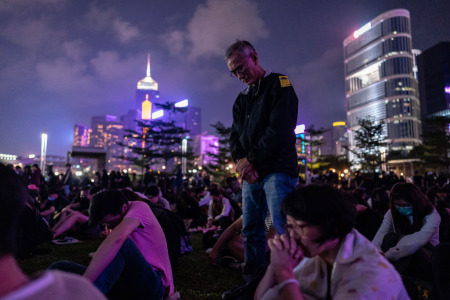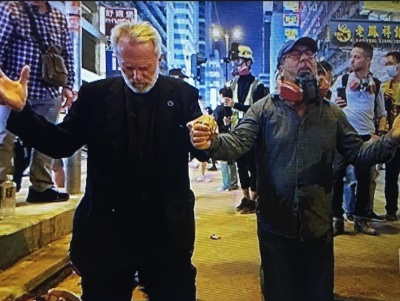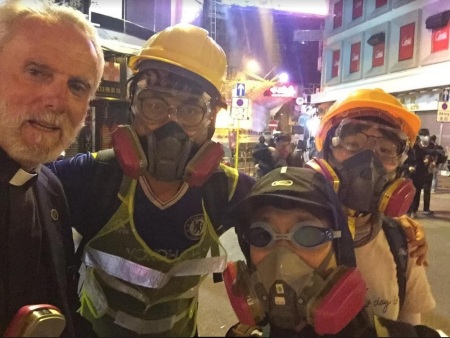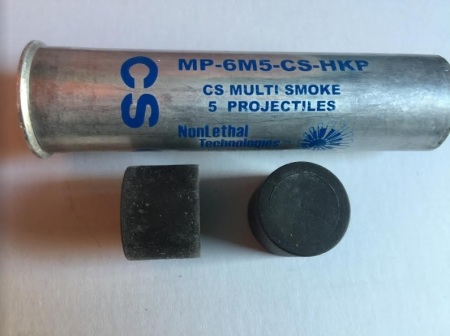American pastors tear-gassed in Hong Kong as they supported pro-democracy protesters

American pastors who traveled to Hong Kong to support the months-long pro-democracy demonstrations say they faced tear gas and water cannons as they stood in solidarity with student demonstrators during one of the most dynamic five-day stretches of the protests.
Rev. Bill Devlin of the Infinity Bible Church in New York City and Rev. Patrick Mahoney of the Christian Defense Coalition were in Hong Kong from Nov. 13 until Nov. 18. They were present as police besieged Hong Kong Polytechnic University where students barricaded themselves in and clashed with riot police.
Devlin and Mahoney say they spent time between PolyU on the Kowloon peninsula and the Chinese University of Hong Kong. Their objective was the share the love of Jesus Christ, pray with demonstrators and encourage them in their call for democracy, liberty and human rights.
“We spent five days there. We met hundreds of students and young people. And we were right in the middle of everything: rubber bullets, tear gas, water cannons,” Devlin told The Christian Post.
“And I forget how many times I personally got tear-gassed. But we were there to basically encourage the people fighting for democracy and human rights to say: ‘You're not alone.”

Although they wore gas masks, Mahoney recalled the pain when tear gas got into his eyes.
“We were praying in the streets. I didn’t have my goggles on. I had my glasses and I thought that would be good enough,” he told CP. “The tear gas fell right at my feet and within 10 seconds my eyes were on fire and I couldn’t see. It was about three minutes before I could see. I had to wash it out with one of those spray things of saline solution.”
Pro-democracy demonstrators object to what they see as the Chinese government’s interference with the semi-autonomy that was promised to Hong Kong when the former British colony returned to Chinese rule in 1997.
Under the agreement that expires in 2047, Hong Kong is a special administrative region that maintains governing and economic systems separate from mainland China. Protestors object to legislation that would allow Hong Kong authorities to extradite fugitives wanted in mainland China. Critics fear such action would undermine Hong Kong’s autonomy and subject Hong Kong residents to Chian’s legal system.
“[T]he persecution and the oppressive nature of the mainland Chinese government in 1997 is not what it is today,” Mahoney said. “Under President Xi, churches have been bulldozed. Christians are being thrown into jail. Uighurs are being put in internment camps.”
“When this 50 years ends and [Hong Kong] becomes part of mainland China, we know right now they will be persecuted,” Mahoney added. “They will be brutalized, they won't be able to get a job, their churches will be monitored.”
Hong Kong protesters wave Trump-Rocky photos at rally https://t.co/FrloFwAhRopic.twitter.com/K4QYcwnGkZ
— The Hill (@thehill) November 29, 2019
Devlin, a regular participant in the U.S. State Department’s International Religious Freedom Roundtable who regularly travels the globe to support persecuted communities through his charity, explained that he spent the better part of three days with the student protesters at PolyU.
PolyU was blockaded by riot police toward the end of the pastors’ trip on Nov. 17. The school was the last of a handful of campuses that pro-democracy protesters had occupied in addition to blocking the Cross-Harbour Tunnel that links the peninsula of Kowloon to Hong Kong Island.
Devlin said that authorities issued a warning to protesters barricaded on campus that they would have to leave by 8 p.m. on Nov. 17 if they wanted to leave without getting arrested.

Devlin, Mahoney and the group of pro-democracy activists they were traveling with determined it was best to leave the campus and avoid arrest because one of the Hong King protesters they were with could have faced years in prison if he were arrested again for protesting.
Later that night, Devlin said, he joined members of the Hong Kong legislative council and Roman Catholic Bishop Joseph Ha to negotiate the release of all the PolyU students who wanted to leave the school without being arrested.
Despite meetings at three police stations throughout the night and early morning, Devlin said Hong Kong riot police would not accept their appeal.
“That was at about 4 a.m. and then police began arresting the doctors, the nurses, the remaining journalists and some of the students and young people that were inside,” Devlin said.
The next evening, the pastors organized a three-hour prayer rally outside the local police station on Nathan Road. Devlin said that dozens of “Hong Kongers” joined them in prayer.
According to Devlin, the prayer meeting was unhindered by authorities. He said a couple of people even prayed to receive Jesus as their Lord and Savior.
At least 1,100 people have been arrested in retaliation to the siege at PolyU, figures reported by media show.
Before the university blockade, protesters and police had engaged in escalating clashes. Videos and news reports showed some protesters throwing explosive devices and starting fires, while others walked around with bows and arrows.
One shocking video seen worldwide is that of a police truck engulfed in flames at PolyU.
However, Devlin stressed that the majority of the protesters in the city were peaceful, including the group of five students that he and Mahoney traveled with. He said he only saw three young men tossing petrol bombs that “didn’t get anywhere near anybody.”
“In any great social movement, including the one that we fought for civil rights here in America, there's going to be a few people that have other ideas about how to accomplish your objectives,” Devlin said.
“Martin Luther King was out there stating ‘we need to be non-violent and resist only with peace.’ Yet, you still had the Black Panthers and other minority members of the civil rights movement that wanted to promote violence.”
Devlin argued that the focus on violent protesters in the media was “overinflated.”
“Most of the young people there were just saying, ‘Hey, we are here as part of the Umbrella Movement,’” said Devlin. “It wasn’t only a symbol of wanting human rights and democracy, it was practical because the umbrellas were used to repel the rubber bullets and the tear gas canisters.”
Mahoney said that a majority of the tear gas canisters were used on peaceful protesters.
“I can say with 100 percent certainty the majority of the tear gas fired and water cannons were used on peaceful protesters, civilians,” Mahoney contended. “I was at an outside restaurant when we were praying for the students at PolyU. They were not demonstrators. They were not protesters and they got tear-gassed. They all went running inside and were throwing up.”
Devlin and Mahoney said that one of the tear gas canisters they found was made by a company based in Homer, Pennsylvania called Nonlethal Technologies.

“Sadly, the majority of the tear gas canisters sold to the Hong Kong government and the police is a company in Homer, Pennsylvania,” Mahoney said. “So we're working with Congress on something called the Hong Kong Protection Act, which would ban American companies from selling tear gas and things like that to Hong Kong.”
The legislation is sponsored by Massachusetts Democrat Rep. James McGovern, New Jersey Republican Rep. Chris Smith and California Democrat Rep. Ro Khanna. The bill passed the House in October.
“The world has now seen eye witness evidence compiled by journalists in the media showing that police have used excessive force and used equipment in violation of manufacturer guidelines and international standards,” McGovern said on the House floor prior to the bill’s passage.
Mahoney said that reports are indicating that the Chinese mainland is producing new tear gas that is “much more lethal” with more toxic elements in it. However, he said that there hasn’t yet been any proof.
“We brought back to America one of those Chinese tear gas containers and we’re looking for labs in America to do an analysis on that,” he said.
It was reported Wednesday that Hong Kong police plan to enter the PolyU on Thursday and end the nearly two-week-long blockade as university staff reported that there are no protesters left on school grounds. Authorities will look to handle leftover “dangerous items and offensive weapons.”
Last week, near-unanimous majorities in the U.S. House and Senate voted in favor of the Hong Kong Human Rights and Democracy Act. The bill was signed by President Donald Trump on Wednesday.
The bill requires the U.S. State Department to report on whether or not Hong Kong's freedoms are being maintained by Beijing.
If the freedoms and semi-autonomy of Hong Kong are not respected by the Chinese government, the U.S. could strip Hong Kong of special status and treat it similar to mainland China when it comes to trade and exports. Losing special status could have dire consequences for the Hong Kong economy.
Follow Samuel Smith on Twitter: @IamSamSmith
or Facebook: SamuelSmithCP





















